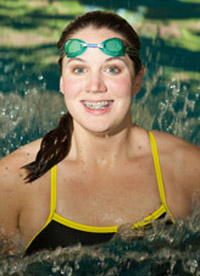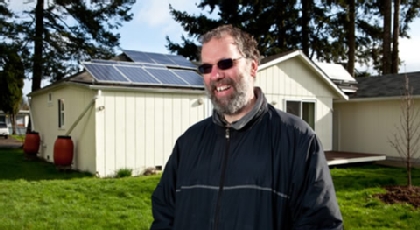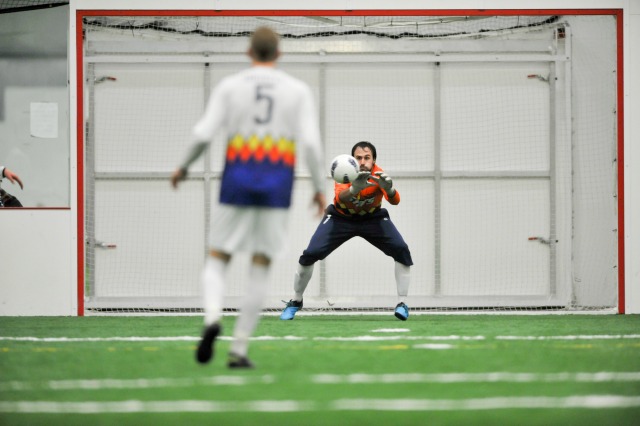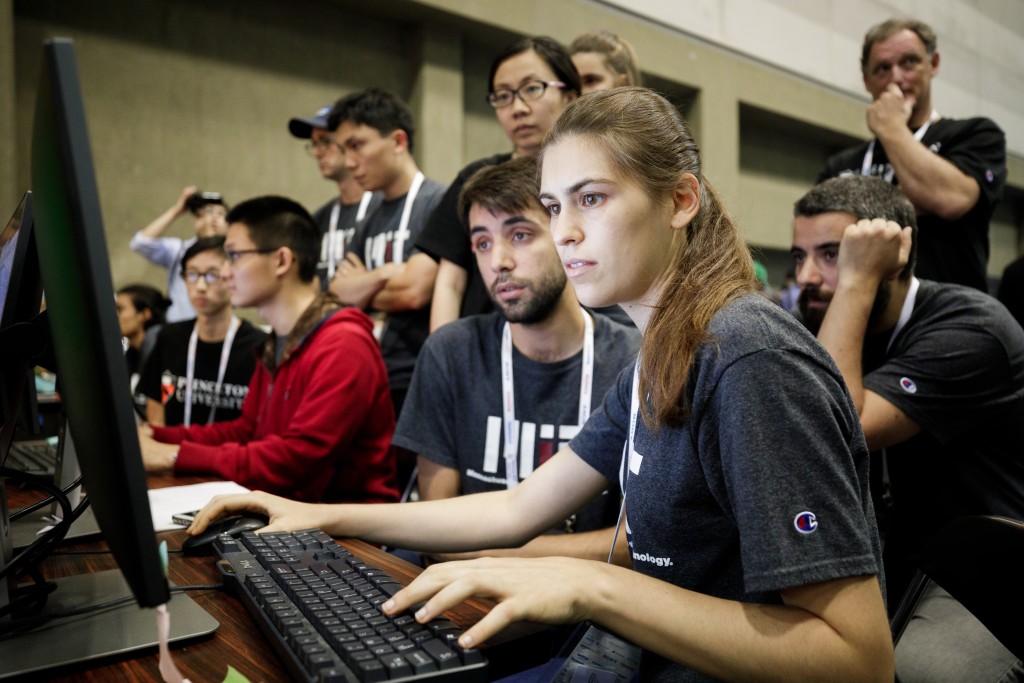Page 64 • (681 results in 0.051 seconds)
-

Jessie Klauder finds a swimming regimen that treats the whole student By Nick Dawson Jessie Klauder ’11 made the decision a year ago. During J-Term of her senior year, Klauder would participate in the School of Nursing’s first study away program in China, where she…
being an athlete?For Klauder, there was little hesitation. Growing up in Klamath Falls, Ore., Klauder learned early from her parents, John and Christine, to work hard in both the classroom and in athletic endeavors. But “school always overrode swimming.” Good grades, her parents told her, will get you to college. And good college grades, Klauder knew, would get her into nursing school. She has taken that to heart, earning Dean’s List recognition during each of her semesters at PLU and entering her
-

Organist off the Grid By Kari Plog ’11 Students and faculty often see Paul Tegels pedaling up and down the hills of Pacific Lutheran University’s campus, rain or shine. Tegels rides his bicycle every day, his common form of transportation, to and from his home…
Froschauer) Tegels, university organist and music professor, humbly underscores his efforts of sustainable living, saying he doesn’t have to go out of his way to do the right thing. “I don’t live far from campus, so it’s not that much of an effort,” he said. “It seems like the right thing to do that you take care of the Earth.” A native of the Netherlands, Tegels hails from a small town in the southeastern part of the region, called Ottersum. He developed an affinity for music early in life, learning the
-

Former Lute Soccer Star Kicks Off New Professional League Andrew Croft ’09 played soccer for a year with the Tacoma Stars. (Photo: ©Wilson Tsoi/goalWA.net) Andrew Croft ’09 is a Goalkeeper for the New Seattle Impact FC, Which Debuts in Kent Nov. 8 By Sandy Deneau…
Stars. He played there a year and then played semi-professional soccer with the Premier Arena Soccer League’s Tacoma Galaxy, helping the team win the 2014 Northwest Division Title in its inaugural season. In between, in early 2013, Croft accepted the Bellevue College job. When the Impact FC held player tryouts, Croft didn’t go—but he didn’t need to. Instead, he sent a resume. Impact FC owner Dion Earl, a former Sounders and SeaDogs player, called Croft personally—and signed him. Croft said there
-

TACOMA, WASH. (June 30, 2016)- One frame. That’s all it took for Kevin Ebi ’95 to get his work on a postage stamp – sort of. Ebi, a self-taught nature photographer who has made a living traveling around the world and documenting its beauty, weathered…
, that meant I was off at 1:30 in the afternoon.” Those early days landed him on mountains or in the water, hiking or kayaking with a camera in tote. “Every day was like a little bit of summer vacation,” he said. “I wanted to share some of those experiences.” So, he read how-to photography books and learned how to tell compelling stories with his images. After word got out about his photos and he started getting emails from editors about using his images, Ebi realized his work stood out and turned it
-

TACOMA, WASH. (Aug. 1, 2016)- Bryanna Plog ’10 seems to have done it all in her years after Pacific Lutheran University – teaching English abroad in Colombia, writing books about travel and interning for a conservation nonprofit. But now, she says, serving as a park…
a tourist. That’s partly what she says her life as a park ranger is like, living in a national park and learning about it on a more intimate level. “Just like studying abroad, how you always learn about the place you are living in,” she said, “I get to do that an entire summer or winter where I visit and grow to know about the places really well.” Bryanna Plog '10 in Cocora Valley, Colombia, in 2013. (Photo courtesy of Plog) Plog’s love for the outdoors started early in life. Growing up, her
-

TACOMA, WASH. (Oct. 17, 2016)- MediaLab at Pacific Lutheran University, the multimedia, applied research organization that celebrates 10 years of success this fall, counts more than 200 students as participants throughout the decade. Those participants are invited to mark the organization’s milestone anniversary Nov. 5…
. “I was tasked with writing a first-hand experience of an outsider’s view of a service at Temple Beth El, in Tacoma,” said Melissa McGuire ’06, an early member of MediaLab. “This project forced me out of my comfort zone and took my writing to a new level. It was one of the hardest, yet most rewarding, assignments I ever worked on.” Also during that inaugural year, MediaLab students filmed and edited MediaLab’s first documentary, titled “Building Connections: Reclaiming Lost Narratives of the
-

TACOMA, WASH. (Dec. 15, 2016) Pacific Lutheran University alumna Jessica Anderson ’07 is passionate about education, geosciences and technology, and has combined all three to become an award-winning educator. In 2016, Anderson was named the Montana Teacher of the Year and received a Presidential Award…
very early age. In high school, I wasn’t interested in science and was an average student in the subject. However, after taking a few geoscience courses from PLU professors Steven Benham and Duncan Foley, my outlook on science changed. I became deeply passionate about geosciences, almost to the point of switching my major. In the end, I found the best route was a mix of teaching and geosciences. You’ve been lauded for your use of technology in the classroom, specifically regarding the blended
-

During his senior year, computer science major Adrian Ronquillo ’22 filled out 203 job applications. Despite already having a job offer from a tech company he was interning with, he wanted to see what other opportunities were available to him. One of those applications included…
. Adrian did a ton of coding early on to prepare and he got really good at them.” Caley was so impressed with Ronquillo’s work ethic that he decided to mirror the way he teaches his students to apply for jobs with how Ronquillo prepared. “He did what he needed to do,” Caley said. “He knew he needed to apply for a lot of jobs. He knew he needed to do a bunch of leak code problems. He knew he needed to have a portfolio and a website. And he did all these things in his capstone.” Ronquillo also worked on
-

Margaret Murdoch ’24, a biology and religious studies major with a minor in gender and sexuality studies, spent their summer in Seattle alongside some of the nation’s best scientists. Experimenting, analyzing, and observing at Fred Hutch Cancer Center , they were able to assist in…
connections I made will serve me for the rest of my career. If you were to offer advice to other students considering internships, what valuable insights would you share with them based on your experience? MM: The most challenging part of this internship was getting to Seattle. It isn’t easy to find housing, so be aware of that and start searching early if your internship does not provide any accommodations. Other than that, internships like this usually give you what you put into them. Also, make sure
-

By Michael Halvorson, Benson Chair in Business and Economic History. On Monday, February 19, 2018 (President’s Day), students at Pacific Lutheran University are invited for a special tour of Amazon’s Seattle headquarters (HQ). The event is being sponsored by Amazon and PLU’s office of Career…
interest to academic communities is the announcement that Amazon will fund Alexa research projects in universities through an Alexa Fund Fellowship program that is in its early stages. While it is my expectation that the Alexa Fund team will look to support research at leading Computer Science programs such as MIT, Carnegie Mellon, Columbia, UC Berkeley, Cambridge (UK), Seoul National University, and the University of Washington, I’m hopeful that research projects will also be funded in associated
Do you have any feedback for us? If so, feel free to use our Feedback Form.


